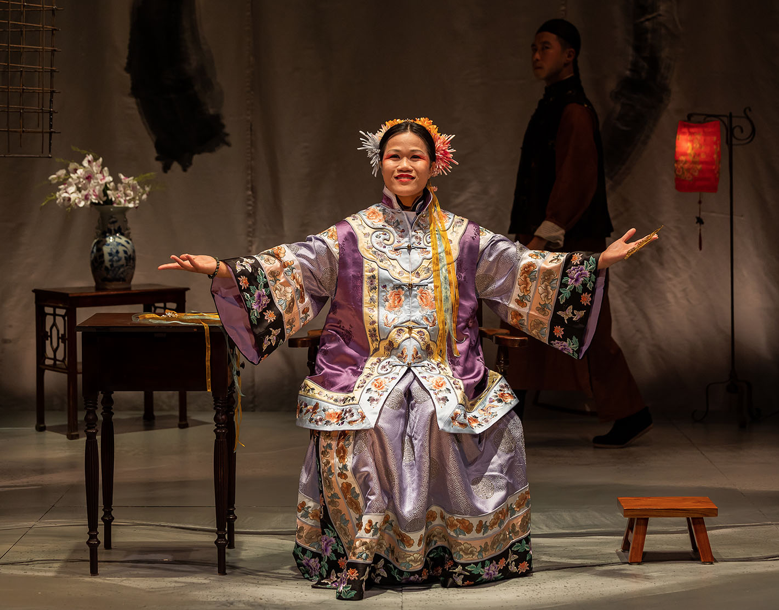
I saw the Central Square Theater's production of Lloyd Suh's The Chinese Lady on Wednesday night. It is the story of Afong May, who is brought from China to the United States at age fourteen in 1834 and put on display in a forerunner of P.T. Barnum's museum and later in the Barnum museum itself. She doesn't quite understand what is happening to her, but gradually as the years go by, she realizes her situation, especially when, at age forty-four, she is about to be replaced, since, as we told, freshly arrived is a new fourteen-year-old cultural curiosity from the Far East. Americans marvel at how Afong May walks in her bound feet, how she eats her rice and shrimp with chopsticks, and how she comports herself in general -- prissily. There is of course a language barrier, but she has a translator and attendant, a Chinese man, Atung, who, as becomes clear when he delivers his monologue, is suppressing his rage at his own situation.
The production could have used better staging, although I understand the financial straits of such a small community theater. I think, too, that Sophori Ngin, who plays Afong May, should have shown more change as the years go by. The sameness may have been the result of a directorial decision, but if so, I think it was an unfortunate one. Atung, played by Jae Woo, expresses a much wider range. Through his varied mannerisms, posture, stance, voice, and gait, I saw and felt his exasperation (at the immature and gullible teenaged Afong May), his lust (for her when she becomes a woman), his anger (at the world that treats him as "irrelevant" at best), and his grief (when Afong May's departure is imminent). Woo also conjures a perfect, cringe-worthy President Andrew Jackson when Afong meets him in Washington, D.C., while she is on a multi-city tour. It's a virtuosic set piece. I wish there were more of them. As it stands, the play is worthy of our attention. I don't think I have finished thinking about it.
The production could have used better staging, although I understand the financial straits of such a small community theater. I think, too, that Sophori Ngin, who plays Afong May, should have shown more change as the years go by. The sameness may have been the result of a directorial decision, but if so, I think it was an unfortunate one. Atung, played by Jae Woo, expresses a much wider range. Through his varied mannerisms, posture, stance, voice, and gait, I saw and felt his exasperation (at the immature and gullible teenaged Afong May), his lust (for her when she becomes a woman), his anger (at the world that treats him as "irrelevant" at best), and his grief (when Afong May's departure is imminent). Woo also conjures a perfect, cringe-worthy President Andrew Jackson when Afong meets him in Washington, D.C., while she is on a multi-city tour. It's a virtuosic set piece. I wish there were more of them. As it stands, the play is worthy of our attention. I don't think I have finished thinking about it.
 RSS Feed
RSS Feed
